Fleurs du Mal Magazine


Or see the index

‘Keen, fitful gusts…’
Keen, fitful gusts are whisp’ring here and there
Among the bushes half leafless, and dry;
The stars look very cold about the sky,
And I have many miles on foot to fare.
Yet feel I little of the cool bleak air,
Or of the dead leaves rustling drearily,
Or of those silver lamps that burn on high,
Or of the distance from home’s pleasant lair:
For I am brimful of the friendliness
That in a little cottage I have found;
Of fair-hair’d Milton’s eloquent distress,
And all his love for gentle Lycid drown’d;
Of lovely Laura in her light green dress,
And faithful Petrarch gloriously crowned.
John Keats
(1795 – 1821)
‘Keen, fitful gusts…’
• fleursdumal.nl magazine
More in: Archive K-L, Archive K-L, John Keats, Keats, John
Mary Shelley verblijft op haar veertiende bij een familie in Schotland, waar een innige vriendschap ontstaat met Isabella Baxter.
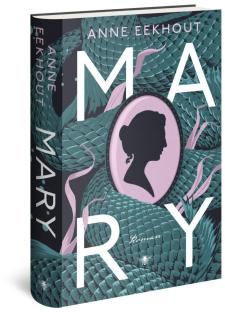 Samen dwalen ze in het gebied dat al eeuwen verhalen herbergt over monsters en geesten, en op een dag stuiten ze diep in het bos op een man die geen man is. De ledematen log en lelijk, een hoofd dat noch menselijk, noch dierlijk is.
Samen dwalen ze in het gebied dat al eeuwen verhalen herbergt over monsters en geesten, en op een dag stuiten ze diep in het bos op een man die geen man is. De ledematen log en lelijk, een hoofd dat noch menselijk, noch dierlijk is.
Vier jaar later brengt Mary met haar geliefde Percy Shelley een bezoek aan haar vrienden John Polidori en Lord Byron, bij het Meer van Genève. ’s Avonds bij het haardvuur vertellen ze elkaar verhalen. Een flintertje herinnering brengt haar terug naar haar tijd met Isabella in Schotland, en ook naar David Booth, een zeer intelligente, charismatische, maar tegelijk ook griezelige man, die een grote interesse in Mary en Isabella ontwikkelde. Dan dient ook het monster uit het bos zich weer aan, en vanuit die gedachte ontstaat haar verhaal over het monster van Frankenstein.
Mary is een ode aan de verbeelding, een verhaal over creëren, over de onlosmakelijke band tussen fantasie en werkelijkheid. En evenals Mary Shelley toont Anne Eekhout de kracht van een vrouw wanneer die iets ter wereld brengt wat niemand voor mogelijk had gehouden.
Anne Eekhout debuteerde in 2014 met de roman Dogma, die werd genomineerd voor de Bronzen Uil voor het beste debuut, op de longlist stond van de AKO Literatuurprijs en die wordt vertaald in het Duits. In 2016 verscheen Op een nacht (genomineerd voor de BNG Literatuurprijs) en in 2019 Nicolas en de verdwijning van de wereld, dat de prijs voor het Beste Boek voor Jongeren won. In november 2021 verschijnt de roman Mary waarin met verbluffende verbeeldingskracht de achttienjarige schepper van het meesterwerk Frankenstein tot leven wordt gewekt.
# new novel
Mary
Auteur: Anne Eekhout
Type: Gebonden
ISBN: 9789403153315
NUR: 301
Aantal pagina’s: 384
Uitgever: De Bezige Bij
Verschijningsdatum: 18-11-2021
Prijs: 24,99
• fleursdumal.nl magazine
More in: #Biography Archives, - Book News, - Bookstores, Archive E-F, Archive S-T, Byron, Byron, Lord, Keats, Keats, John, Mary Shelley, Percy Byssche Shelley, Shelley, Shelley, Mary, Shelley, Percy Byssche
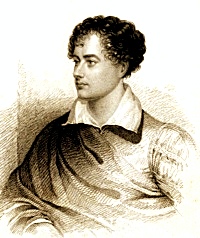
John Keats Poem
Who killed John Keats?
‘I,’ says the Quarterly,
So savage and Tartarly;
”Twas one of my feats.’
Who shot the arrow?
‘The poet-priest Milman
(So ready to kill man),
Or Southey or Barrow.
George Gordon Byron
(1788 – 1824)
John Keats Poem
• fleursdumal.nl magazine
More in: Archive A-B, Archive A-B, Byron, Lord, Keats, John
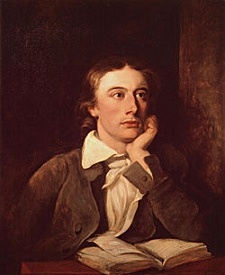
John Keats
La Belle Dame Sans Merci
Ah, what can ail thee, wretched wight,
Alone and palely loitering;
The sedge is wither’d from the lake,
And no birds sing.
Ah, what can ail thee, wretched wight,
So haggard and so woe-begone?
The squirrel’s granary is full,
And the harvest’s done.
I see a lily on thy brow,
With anguish moist and fever dew;
And on thy cheek a fading rose
Fast withereth too.
I met a lady in the meads
Full beautiful, a faery’s child;
Her hair was long, her foot was light,
And her eyes were wild.
I set her on my pacing steed,
And nothing else saw all day long;
For sideways would she lean, and sing
A faery’s song.
I made a garland for her head,
And bracelets too, and fragrant zone;
She look’d at me as she did love,
And made sweet moan.
She found me roots of relish sweet,
And honey wild, and manna dew;
And sure in language strange she said,
I love thee true.
She took me to her elfin grot,
And there she gaz’d and sighed deep,
And there I shut her wild sad eyes–
So kiss’d to sleep.
And there we slumber’d on the moss,
And there I dream’d, ah woe betide,
The latest dream I ever dream’d
On the cold hill side.
I saw pale kings, and princes too,
Pale warriors, death-pale were they all;
Who cry’d–“La belle Dame sans merci
Hath thee in thrall!”
I saw their starv’d lips in the gloam
With horrid warning gaped wide,
And I awoke, and found me here
On the cold hill side.
And this is why I sojourn here
Alone and palely loitering,
Though the sedge is wither’d from the lake,
And no birds sing.
John Keats (1795 – 1821)
La Belle Dame Sans Merci
fleursdumal.nl magazine
More in: Archive K-L, John Keats, Keats, John

John Keats
Ode On A Grecian Urn
Thou still unravish’d bride of quietness,
Thou foster-child of silence and slow time,
Sylvan historian, who canst thus express
A flowery tale more sweetly than our rhyme:
What leaf-fring’d legend haunts about thy shape
Of deities or mortals, or of both,
In Tempe or the dales of Arcady?
What men or gods are these? What maidens loth?
What mad pursuit? What struggle to escape?
What pipes and timbrels? What wild ecstasy?
Heard melodies are sweet, but those unheard
Are sweeter; therefore, ye soft pipes, play on;
Not to the sensual ear, but, more endear’d,
Pipe to the spirit ditties of no tone:
Fair youth, beneath the trees, thou canst not leave
Thy song, nor ever can those trees be bare;
Bold Lover, never, never canst thou kiss,
Though winning near the goal yet, do not grieve;
She cannot fade, though thou hast not thy bliss,
For ever wilt thou love, and she be fair!
Ah, happy, happy boughs! that cannot shed
Your leaves, nor ever bid the Spring adieu;
And, happy melodist, unwearied,
For ever piping songs for ever new;
More happy love! more happy, happy love!
For ever warm and still to be enjoy’d,
For ever panting, and for ever young;
All breathing human passion far above,
That leaves a heart high-sorrowful and cloy’d,
A burning forehead, and a parching tongue.
Who are these coming to the sacrifice?
To what green altar, O mysterious priest,
Lead’st thou that heifer lowing at the skies,
And all her silken flanks with garlands drest?
What little town by river or sea shore,
Or mountain-built with peaceful citadel,
Is emptied of this folk, this pious morn?
And, little town, thy streets for evermore
Will silent be; and not a soul to tell
Why thou art desolate, can e’er return.
O Attic shape! Fair attitude! with brede
Of marble men and maidens overwrought,
With forest branches and the trodden weed;
Thou, silent form, dost tease us out of thought
As doth eternity: Cold Pastoral!
When old age shall this generation waste,
Thou shalt remain, in midst of other woe
Than ours, a friend to man, to whom thou say’st,
“Beauty is truth, truth beauty,–that is all
Ye know on earth, and all ye need to know.”
John Keats (1795 – 1821)
Ode On A Grecian Urn
fleursdumal.nl magazine
More in: Archive K-L, Keats, John
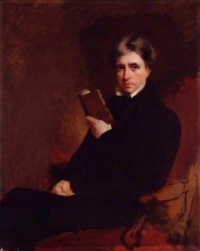
Leigh Hunt
(1784 – 1859)
On Receiving A Crown Of Ivy From John Keats
A Crown of of ivy! I submit my head
To the young hand that gives it, –young, ’tis true,
But with a right, for ’tis a poet’s too.
How pleasant the leaves feel! and how they spread
With their broad angles, like a nodding shed
Over both eyes! and how complete and new,
As on my hand I lean, to feel them strew
My sense with freshness, — Fancy’s rustling bed!
Tress-tossing girls, with smell of flowers and grapes
Come dancing by, and downward piping cheeks,
And up-thrown cymbals, and Silenus old
Lumpishly borne, and many trampling shapes,–
And lastly, with his bright eyes on her bent,
Bacchus, — whose bride has of his hand fast hold.
Leigh Hunt poetry
fleursdumal.nl magazine
More in: Archive G-H, Archive K-L, Hunt, Leigh, Keats, John
 Letter to Leigh Hunt by John Keats
Letter to Leigh Hunt by John Keats
Margate, May 10th, 1817
My dear Hunt
The little Gentleman that sometimes lurks in a gossips bowl ought to have come in very likeness of a coasted crab and choaked me outright for not having answered your Letter ere this – however you must not suppose that I was in Town to receive it, no, it followed me to the isle of Wight and I got it just as I was going to pack up for Margate, for reasons which you anon shall hear. On arriving at this treeless affair I wrote to my Brother George to request C. C. C. to do the thing you wot of respecting Rimini; and George tells me he has undertaken it with great Pleasure; so I hope there has been an understanding between you for many Proofs – – C. C. C. is well acquainted with Bensley. Now why did you not send the Key of your Cupboard which I know was full of Papers? We would have lock’d them all in a trunk together with those you told me to destroy; which indeed I did not do for fear of demolishing Receipts. There not being a more unpleasant thing in the world (saving a thousand and one others) than to pay a Bill twice. Mind you – old Wood’s a very Varmant – sharded in Covetousness – And now I am upon a horrid subject – what a horrid one you were upon last sunday and well you handled it. The last Examiner was a Battering Ram against Christianity – Blasphemy – Tertullian – Erasmus – Sr. Philip Sidney. And then the dreadful Petzelians and their expiation by Blood – and do Christians shudder at the same thing in a Newspaper which they attribute to their God in its most aggravated form? What is to be the end of this? I must mention Hazlitt’s Southey – O that he had left out the grey hairs! Or that they had been in any other Paper not concluding with such a Thunderclap – that sentence about making a Page of the feeling of a whole life appears to me like a Whale’s back in the Sea of Prose. I ought to have said a word on Shakspeare’s Chrisitanity – there are two, which I have not looked over with you, touching the thing: the one for, the other against. That in favour is in Measure for Measure Act 2. S. 2 Isab. Alas! alas!
Why all the Souls that were, were forfeit once And he that might the vantage best have took, Found out the Remedy –
That against is in Twelfth Night. Act 3. S. 2. Maria – for there is no Christian, that means to be saved by believing rightly, can ever believe such impossible Passages of grossness! Before I come to the Nymphs I must get through all disagreeables – I went to the Isle of Wight – thought so much about Poetry so long together that I could not get to sleep at night – and moreover, I know not how it was, I could not get wholesome food – By this means in a Week or so I became not over capable in my upper Stories, and set off pell mell for Margate, at least 150 Miles – because forsooth I fancied that I should like my old Lodging here, and could contrive to do without Trees. Another thing I was too much in Solitude, and consequently was obliged to be in continual burning of thought as an only resource. However Tom is with me at present and we are very comfortable. We intend though to get among some Trees. How have you got on among them? How are the Nymphs? I suppose they have led you a fine dance – Where are you now. In Judea, Cappadocia, or the Parts of Lybia about Cyrene, Strangers from “Heaven, Hues and Prototypes. I wager you have given several new turns to the old saying “Now the Maid was fair and pleasant to look on” as well as made a little variation in “once upon a time” perhaps too you have rather varied “thus endeth the first Lesson” I hope you have made a Horseshoebusiness of – “unsuperfluous lift” “faint Bowers” and fibrous roots. I vow that I have been down in the Mouth lately at this Work. These last two days however I have felt more confident – I have asked myself so often why I should be a Poet more than other Men, – seeing how great a thing it is, – how great things are to be gained by it – What a thing to be in the Mouth of Fame – that at last the Idea has grown so monstrously beyond my seeming Power of attainment that the other day I nearly consented with myself to drop into a Phæton – yet ’tis a disgrace to fail even in a huge attempt, and at this moment I drive the thought from me. I began my Poem about a Fortnight since and have done some every day except travelling ones – Perhaps I may have done a good deal for the time but it appears such a Pin’s Point to me that I will not coppy any out. When I consider that so many of these Pin points go to form a Bodkin point (God send I end not my Life with a bare Bodkin, in its modern sense) and that it requires a thousand and more unpleasant (it may come among the thousand and one) than to be so journeying and miss the Goal at last. But I intend to whistle all these cogitations into the Sea where I hope they will breed Storms violent enough to block up all exit from Russia. Does Shelley go on telling strange Stories of the Death of Kings? Tell him there are strange Stories of the death of Poets – some have died before they were conceived “how do you make that out Master Vellum”. Does Mrs. S. cut Bread and Butter as neatly as ever? Tell her to procure some fatal Scissors and cut the thread of Life of all to be disappointed Poets. Does Mrs Hunt tear linen in half as straight as ever? Tell her to tear from the book of Life all blank Leaves. Remember me to them all – to Miss Kent and the little ones all.
Your sincere friend
John Keats alias Junkets
Letter to Leigh Hunt (1784 – 1859) by John Keats (1795 – 1821)
fleursdumal.nl magazine
More in: Archive G-H, Archive K-L, Hunt, Leigh, Keats, John

Leigh Hunt
(1784 – 1859)
To John Keats
‘Tis well you think me truly one of those,
Whose sense discerns the loveliness of things;
For surely as I feel the bird that sings
Behind the leaves, or dawn as it up grows,
Or the rich bee rejoicing as he goes,
Or the glad issue of emerging springs,
Or overhead the glide of a dove’s wings,
Or turf, or trees, or, midst of all, repose.
And surely as I feel things lovelier still,
The human look, and the harmonious form
Containing woman, and the smile in ill,
And such a heart as Charles’s, wise and warm,–
As surely as all this, I see, ev’n now,
Young Keats, a flowering laurel on your brow.
Leigh Hunt poetry
fleursdumal.nl magazine
More in: Archive G-H, Archive K-L, Hunt, Leigh, Keats, John
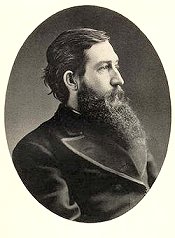
Sidney Lanier
(1842 – 1881)
Clover
Inscribed to the Memory of John Keats
Dear uplands, Chester’s favorable fields,
My large unjealous Loves, many yet one —
A grave good-morrow to your Graces, all,
Fair tilth and fruitful seasons!
Lo, how still!
The midmorn empties you of men, save me;
Speak to your lover, meadows! None can hear.
I lie as lies yon placid Brandywine,
Holding the hills and heavens in my heart
For contemplation.
‘Tis a perfect hour.
From founts of dawn the fluent autumn day
Has rippled as a brook right pleasantly
Half-way to noon; but now with widening turn
Makes pause, in lucent meditation locked,
And rounds into a silver pool of morn,
Bottom’d with clover-fields. My heart just hears
Eight lingering strokes of some far village-bell,
That speak the hour so inward-voiced, meseems
Time’s conscience has but whispered him eight hints
Of revolution. Reigns that mild surcease
That stills the middle of each rural morn —
When nimble noises that with sunrise ran
About the farms have sunk again to rest;
When Tom no more across the horse-lot calls
To sleepy Dick, nor Dick husk-voiced upbraids
The sway-back’d roan for stamping on his foot
With sulphurous oath and kick in flank, what time
The cart-chain clinks across the slanting shaft,
And, kitchenward, the rattling bucket plumps
Souse down the well, where quivering ducks quack loud,
And Susan Cook is singing.
Up the sky
The hesitating moon slow trembles on,
Faint as a new-washed soul but lately up
From out a buried body. Far about,
A hundred slopes in hundred fantasies
Most ravishingly run, so smooth of curve
That I but seem to see the fluent plain
Rise toward a rain of clover-blooms, as lakes
Pout gentle mounds of plashment up to meet
Big shower-drops. Now the little winds, as bees,
Bowing the blooms come wandering where I lie
Mixt soul and body with the clover-tufts,
Light on my spirit, give from wing and thigh
Rich pollens and divine sweet irritants
To every nerve, and freshly make report
Of inmost Nature’s secret autumn-thought
Unto some soul of sense within my frame
That owns each cognizance of the outlying five,
And sees, hears, tastes, smells, touches, all in one.
Tell me, dear Clover (since my soul is thine,
Since I am fain give study all the day,
To make thy ways my ways, thy service mine,
To seek me out thy God, my God to be,
And die from out myself to live in thee) —
Now, Cousin Clover, tell me in mine ear:
Go’st thou to market with thy pink and green?
Of what avail, this color and this grace?
Wert thou but squat of stem and brindle-brown,
Still careless herds would feed. A poet, thou:
What worth, what worth, the whole of all thine art?
Three-Leaves, instruct me! I am sick of price.
Framed in the arching of two clover-stems
Where-through I gaze from off my hill, afar,
The spacious fields from me to Heaven take on
Tremors of change and new significance
To th’ eye, as to the ear a simple tale
Begins to hint a parable’s sense beneath.
The prospect widens, cuts all bounds of blue
Where horizontal limits bend, and spreads
Into a curious-hill’d and curious-valley’d Vast,
Endless before, behind, around; which seems
Th’ incalculable Up-and-Down of Time
Made plain before mine eyes. The clover-stems
Still cover all the space; but now they bear,
For clover-blooms, fair, stately heads of men
With poets’ faces heartsome, dear and pale —
Sweet visages of all the souls of time
Whose loving service to the world has been
In the artist’s way expressed and bodied. Oh,
In arms’ reach, here be Dante, Keats, Chopin,
Raphael, Lucretius, Omar, Angelo,
Beethoven, Chaucer, Schubert, Shakespeare, Bach,
And Buddha (sweetest masters! Let me lay
These arms this once, this humble once, about
Your reverend necks — the most containing clasp,
For all in all, this world e’er saw!) and there,
Yet further on, bright throngs unnamable
Of workers worshipful, nobilities
In the Court of Gentle Service, silent men,
Dwellers in woods, brooders on helpful art,
And all the press of them, the fair, the large,
That wrought with beauty.
Lo, what bulk is here?
Now comes the Course-of-things, shaped like an Ox,
Slow browsing, o’er my hillside, ponderously —
The huge-brawned, tame, and workful Course-of-things,
That hath his grass, if earth be round or flat,
And hath his grass, if empires plunge in pain
Or faiths flash out. This cool, unasking Ox
Comes browsing o’er my hills and vales of Time,
And thrusts me out his tongue, and curls it, sharp,
And sicklewise, about my poets’ heads,
And twists them in, all — Dante, Keats, Chopin,
Raphael, Lucretius, Omar, Angelo,
Beethoven, Chaucer, Schubert, Shakespeare, Bach,
And Buddha, in one sheaf — and champs and chews,
With slantly-churning jaws, and swallows down;
Then slowly plants a mighty forefoot out,
And makes advance to futureward, one inch.
So: they have played their part.
And to this end?
This, God? This, troublous-breeding Earth? This, Sun
Of hot, quick pains? To this no-end that ends,
These Masters wrought, and wept, and sweated blood,
And burned, and loved, and ached with public shame,
And found no friends to breathe their loves to, save
Woods and wet pillows? This was all? This Ox?
“Nay,” quoth a sum of voices in mine ear,
“God’s clover, we, and feed His Course-of-things;
The pasture is God’s pasture; systems strange
Of food and fiberment He hath, whereby
The general brawn is built for plans of His
To quality precise. Kinsman, learn this:
The artist’s market is the heart of man;
The artist’s price, some little good of man.
Tease not thy vision with vain search for ends.
The End of Means is art that works by love.
The End of Ends . . . in God’s Beginning’s lost.”
Summer of 1876
Sidney Lanier poetry
fleursdumal.nl magazine
More in: Archive K-L, CLASSIC POETRY, Keats, John
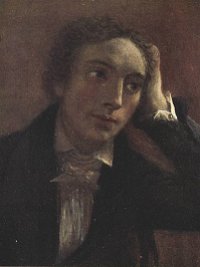
John Keats
(1795-1821)
To Mrs Reynolds’s Cat
Cat! who hast passed thy grand climacteric,
How many mice and rats hast in thy days
Destroyed? How many tit-bits stolen? Gaze
With those bright languid segments green, and prick
Those velvet ears – but prithee do not stick
Thy latent talons in me, and up-raise
Thy gentle mew, and tell me all thy frays
Of fish and mice, and rats and tender chick.
Nay, look not down, nor lick thy dainty wrists –
For all thy wheezy asthma, and for all
Thy tail’s tip is nicked off, and though the fists
Of many a maid have given thee many a maul,
Still is that fur as soft as when the lists
In youth thou enteredst on glass-bottled wall.
John Keats poetry
fleursdumal.nl magazine
More in: Archive K-L, Keats, John
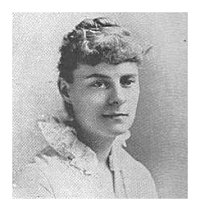
Lizette Woodworth Reese
(1856–1935)
Keats
An English lad, who, reading in a book,
A ponderous, leathern thing set on his knee,
Saw the broad violet of the Egean Sea
Lap at his feet as it were village brook.
Wide was the east; the gusts of morning shook;
Immortal laughter beat along that shore;
Pan, crouching in the reeds, piped as of yore;
The gods came down and thundered from that book.
He lifted his sad eyes; his London street
Swarmed in the sun, and strove to make him heed;
Boys spun their tops, shouting and fair of cheek:
But, still, that violet lapping at his feet,—
An English lad had he sat down to read;
But he rose up and knew himself a Greek.
Lizette Woodworth Reese poetry
fleursdumal.nl magazine
More in: Archive W-X, CLASSIC POETRY, Keats, John
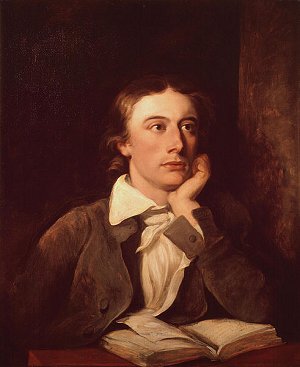
John Keats
(1795 – 1821)
When I Have Fears
When I have fears that I may cease to be
Before my pen has gleaned my teeming brain,
Before high-piled books, in charactery,
Hold like rich garners the full ripened grain;
When I behold, upon the night’s starred face,
Huge cloudy symbols of a high romance,
And think that I may never live to trace
Their shadows, with the magic hand of chance;
And when I feel, fair creature of an hour,
That I shall never look upon thee more,
Never have relish in the fairy power
Of unreflecting love; – then on the shore
Of the wide world I stand alone, and think
Till love and fame to nothingness do sink.
John Keats poetry
fleursdumal.nl magazine
More in: Archive K-L, John Keats, Keats, John
Thank you for reading Fleurs du Mal - magazine for art & literature